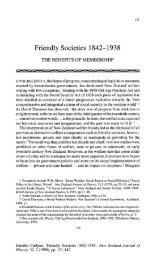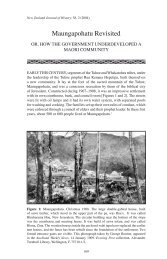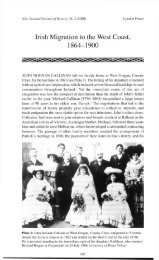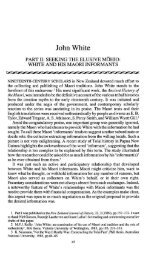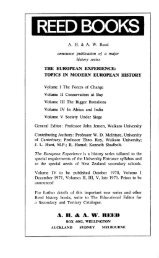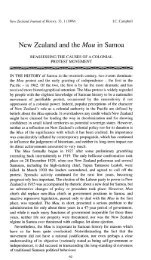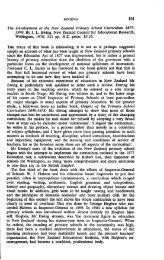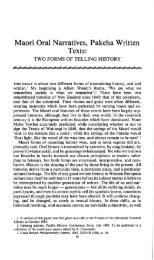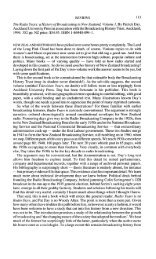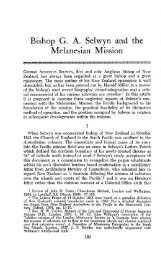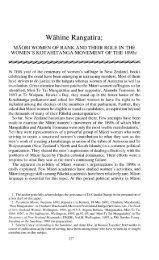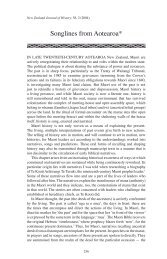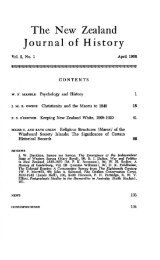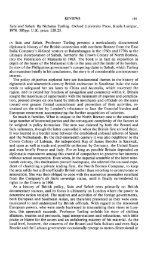Some Reasons for the Failure of the Roman Catholic Mission to the ...
Some Reasons for the Failure of the Roman Catholic Mission to the ...
Some Reasons for the Failure of the Roman Catholic Mission to the ...
Create successful ePaper yourself
Turn your PDF publications into a flip-book with our unique Google optimized e-Paper software.
ROMAN CATHOLIC MISSION TO THE MAORIS, 1838-1860 167<br />
anti-<strong>Catholic</strong> and anti-French sentiments in friendly nor<strong>the</strong>rn Maoris,<br />
and soon after <strong>the</strong>ir arrival <strong>the</strong> <strong>Catholic</strong>s were in fact threatened with<br />
expulsion by Protestant Maoris backed, as rumour had it, by <strong>the</strong>ir<br />
Pakeha teachers. Since <strong>Roman</strong> <strong>Catholic</strong> priests had been expelled from<br />
Tahiti as recently as 1836, <strong>the</strong> possibility cannot have seemed remote. 2<br />
It soon became clear, however, that <strong>the</strong> <strong>Catholic</strong> right <strong>to</strong> evangelise<br />
was supported not only by <strong>the</strong> French navy but also by James Busby,<br />
probably acting on instructions from Sydney: his influence in securing<br />
Pompallier's safety was accounted decisive by at least one cool-headed<br />
Frenchman. 3 So within a few months Pompallier's mission was assured<br />
<strong>of</strong> a future in New Zealand, even if in <strong>the</strong> Protestant-dominated north<br />
it could not be a bright one: <strong>Catholic</strong> Frenchmen might be <strong>to</strong>lerated<br />
by British <strong>of</strong>ficials, but <strong>the</strong>y were ana<strong>the</strong>ma <strong>to</strong> <strong>the</strong> Protestant missionaries.<br />
Many missionaries, both <strong>Catholic</strong> and Protestant, had grown up in<br />
an atmosphere <strong>of</strong> Anglo-French rivalry, and as a group <strong>the</strong>y were not<br />
<strong>for</strong>ward-looking politically. So nationality was one good reason <strong>for</strong><br />
mutual distrust, and James Stack was not alone in suspecting that <strong>the</strong><br />
bishop was 'a wily political agent <strong>for</strong> <strong>the</strong> French Government'. 4 C.M.S.<br />
missionaries, whe<strong>the</strong>r or not <strong>the</strong>y favoured British annexation <strong>of</strong> New<br />
Zealand, were horrified at <strong>the</strong> possibility <strong>of</strong> <strong>Catholic</strong> missionaries predisposing<br />
natives in favour <strong>of</strong> France and so, perhaps, helping France<br />
gain a footing in New Zealand. Protestant Maoris were also suspicious<br />
<strong>of</strong> French intentions. 5 Both Protestant and <strong>Catholic</strong> missionaries were<br />
<strong>for</strong>bidden <strong>to</strong> interfere in political matters, and in New Zealand <strong>the</strong><br />
<strong>Catholic</strong>s kept clearer <strong>of</strong> <strong>the</strong>m than <strong>the</strong> C.M.S. missionaries; but since<br />
converted Maoris <strong>of</strong>ten asked advice on purely secular matters, it was<br />
impossible <strong>to</strong> avoid politics al<strong>to</strong>ge<strong>the</strong>r. <strong>Mission</strong>aries inevitably tended<br />
<strong>to</strong> prejudice Maoris in favour <strong>of</strong> <strong>the</strong>ir own home country. Pompallier<br />
would certainly have been happy <strong>to</strong> see French influence in New<br />
Zealand increased. The penetration <strong>of</strong> French <strong>Roman</strong> <strong>Catholic</strong> missions<br />
in<strong>to</strong> <strong>the</strong> Pacific coincided with <strong>the</strong> expansion <strong>of</strong> <strong>the</strong> French navy <strong>the</strong>re,<br />
and up <strong>to</strong> a point <strong>the</strong> navy and <strong>the</strong> missionaries worked <strong>to</strong>ge<strong>the</strong>r: <strong>the</strong><br />
navy helped missionaries gain a footing in areas dominated by Protestants,<br />
and <strong>the</strong> missionaries deliberately spread a good opinion <strong>of</strong> France<br />
among <strong>the</strong> natives. 6<br />
2 See J. B. F. Pompallier, Early His<strong>to</strong>ry <strong>of</strong> <strong>the</strong> <strong>Catholic</strong> Church in Oceania,<br />
trans. Arthur Herman, Auckland, 1888, pp. 37-40, 43-44; Baron Charles<br />
de Thierry, Proclamation, dated 6 February 1838, MS. in Thierry Papers, Auckland<br />
Public Library.<br />
3 Pompallier <strong>to</strong> Colin, 23 December 1837, Annales de la propagation de la<br />
foi, Lyons, XI, 73. Williams <strong>to</strong> CMS, 11 January 1838, Henry Williams, Letters<br />
1822-1860 <strong>to</strong> CMS, typescript, Vol. II, p. 364, Hocken Library, University <strong>of</strong><br />
Otago. Abel du Petit-Thouars, Voyage au<strong>to</strong>ur du monde sur la fregale Venus,<br />
Paris, 1841, III, 44-45. Pompallier, Early His<strong>to</strong>ry, pp. 40-42.<br />
4 Stack <strong>to</strong> CMS, 4 April 1840, Church <strong>Mission</strong>ary Society, Archives Relating<br />
<strong>to</strong> <strong>the</strong> Australian and New Zealand <strong>Mission</strong>s, 1808-1884, MS. micr<strong>of</strong>ilm, CN/078.<br />
s e.g. Shepherd <strong>to</strong> CMS, 23 September 1839, CN/076.<br />
6 See Archives <strong>of</strong> <strong>the</strong> French Ministry <strong>of</strong> Marine, Documents relatifs aux<br />
missions de la Polynesie, micr<strong>of</strong>ilm, National Archives, Welling<strong>to</strong>n; extract from<br />
J. B. F. Pompallier, Instruction pour les travaux de la mission, quoted in Taylor,<br />
p. 35.



